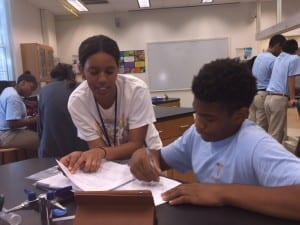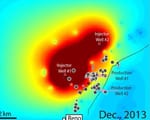New assessment tool for teachers to measure math reasoning skills can drive effort to intervene early in ongoing struggles of U.S. elementary and high school students
A $2.5 million grant from the National Science Foundation to researchers at Southern Methodist University, Dallas, targets the ongoing struggle of U.S. elementary and high school students with math.
When it comes to the STEM fields of science, technology, engineering and math, research shows that U.S. students continue at a disadvantage all the way through high school and entering college.
The four-year NSF grant to the Annette Caldwell Simmons School of Education and Human Development is led by SMU K-12 math education experts Leanne Ketterlin Geller and Lindsey Perry. They will conduct research and develop an assessment system comprised of two universal screening tools to measure mathematical reasoning skills for grades K–2.
“This is an opportunity to develop an assessment system that can help teachers support students at the earliest, and arguably one of the most critical, phases of a child’s mathematical development,” said Ketterlin Geller, a professor in the Simmons School and principal investigator for the grant developing the “Measures of Mathematical Reasoning Skills” system.
Teachers and schools will use the assessment system to screen students and determine who is at risk for difficulty in early mathematics, including students with disabilities. The measures also will help provide important information about the intensity of support needed for a given student.
Few assessments are currently available to measure the critical math concepts taught during those early school years, Ketterlin Geller said.
“Providing teachers with data to understand how a child processes these concepts can have a long-term impact on students’ success not only in advanced math like algebra, but also success in STEM fields, such as chemistry, biology, geology and engineering,” she said.
Early math a better predictor of future learning
A 2015 Mathematics National Assessment of Education Progress report found that only 40 percent of U.S. fourth-grade students were classified as proficient or advanced, and those numbers have not improved between 2009 and 2015. In fact, the geometry scale of the fourth-grade mathematics report was significantly lower in 2015 than in 2009.
Early mathematics is a better and more powerful predictor of future learning, including reading and mathematics achievement, compared to early reading ability or other factors such as attention skills, according to one 2007 study on school readiness.
Research also has found that students’ early mathematics knowledge is a more powerful predictor of their future socioeconomic status at age 42 than their family’s socioeconomic status as children.
Early mathematics comprises numerous skills. However, number sense — the ability to work with numbers flexibly — in addition to spatial sense — the ability to understand the complexity of one’s environment — are consistently identified as two of the main components that should be emphasized in early mathematics standards and instruction, say the SMU researchers.
The Measures of Mathematical Reasoning Skills system will contain tests for both numeric relational reasoning and spatial reasoning.
Universal screening tools focused on these topics do not yet exist
“I’m passionate about this research because students who can reason spatially and relationally with numbers are better equipped for future mathematics courses, STEM degrees and STEM careers,” said Perry, whose doctoral dissertation for her Ph.D. from SMU in 2016 specifically focused on those two mathematical constructs.
“While these are very foundational and predictive constructs, these reasoning skills have typically not been emphasized at these grade levels, and universal screening tools focused on these topics do not yet exist,” said Perry, who is co-principal investigator.
“Since intervention in the early elementary grades can significantly improve mathematics achievement, it is critical that K-2 teachers have access to high-quality screening tools to help them with their intervention efforts,” she said. “We feel that the Measures of Mathematical Reasoning Skills system can really make a difference for K-2 teachers as they prepare the next generation of STEM leaders.”
The four-year project, Measuring Early Mathematical Reasoning Skills: Developing Tests of Numeric Relational Reasoning and Spatial Reasoning, started Sept. 15, 2017. It employs an iterative research design for developing formative assessments, a process that Ketterlin Geller has devoted much of her 20-year career to.
Ketterlin Geller is Texas Instruments Endowed Chair in Education and director of Research in Mathematics Education in SMU’s Annette Caldwell Simmons School of Education and Human Development. She is also a Fellow with the Caruth Institute for Engineering Education in the Lyle School of Engineering.


 $3.78 million awarded by Department of Defense to SMU STEM project for minority students
$3.78 million awarded by Department of Defense to SMU STEM project for minority students Kennewick Man: genome sequence of 8,500-year-old skeleton solves scientific controversy
Kennewick Man: genome sequence of 8,500-year-old skeleton solves scientific controversy At peak fertility, women who desire to maintain body attractiveness report they eat less
At peak fertility, women who desire to maintain body attractiveness report they eat less SMU seismology team to cooperate with state, federal scientists in study of May 7 Venus, Texas earthquake
SMU seismology team to cooperate with state, federal scientists in study of May 7 Venus, Texas earthquake 1st proton collisions at the world’s largest science experiment expected to start the first or second week of June
1st proton collisions at the world’s largest science experiment expected to start the first or second week of June Most likely cause of 2013-14 earthquakes: Combination of gas field fluid injection, removal
Most likely cause of 2013-14 earthquakes: Combination of gas field fluid injection, removal Physicists tune Large Hadron Collider to find “sweet spot” in high-energy proton smasher
Physicists tune Large Hadron Collider to find “sweet spot” in high-energy proton smasher SMU geothermal scientist Maria Richards to guide global energy organization
SMU geothermal scientist Maria Richards to guide global energy organization




